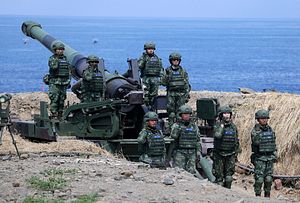America’s top representative in Taiwan said Thursday that Washington expects the island to continue increasing its defense spending as Chinese security threats to the U.S. ally continue to grow.
W. Brent Christensen said the United States had “not only observed Taiwan’s enthusiasm to pursue necessary platforms to ensure its self-defense, but also its evolving tenacity to develop its own indigenous defense industry.”
That was a nod to President Tsai Ing-wen’s drive to develop domestic training jets, submarines and other weapons technology, supplementing arms bought from the United States.
“These investments by Taiwan are commendable, as is Taiwan’s ongoing commitment to increase the defense budget annually to ensure that Taiwan’s spending is sufficient to provide for its own self-defense needs,” Christensen said in a speech. “And we anticipate that these figures will continue to grow commensurate with the threats Taiwan faces.”
Christensen is the director of the American Institute in Taiwan, which has served as the de facto U.S. Embassy in Taiwan since formal diplomatic relations were cut in 1979.
While China and Taiwan split during a civil war in 1949, Beijing still considers Taiwan Chinese territory and has increased its threats to annex the self-governing democracy by force if necessary.
Despite the lack of formal diplomatic ties, U.S. law requires Washington to ensure Taiwan has the means to defend itself.
Since 2008, U.S. administrations have notified Congress of more than $24 billion in foreign military sales to Taiwan, including in the past two months the sale of 108 M1A2 Abrams tanks and 250 Stinger missiles, valued at $2.2 billion dollars, Christensen said.
The Trump administration alone has notified Congress of $4.4 billion in arms sales to Taiwan, he said.
China has responded furiously to all such sales and recently announced it would impose sanctions on any U.S. enterprises involved in such deals, saying they undermine China’s sovereignty and national security.
Tsai has adamantly rejected Chinese pressure to reunite Taiwan and China under the “one-country, two-systems” framework that governs Hong Kong. She and many Taiwanese have said that the people of the island stand with the young people of Hong Kong who are fighting for democratic freedoms in ongoing protests.
Tsai, who says she will seek a second four-year term next year, has said Taiwan was also stepping-up training as it prepared to transition to an all-volunteer force and has raised the defense budget for three consecutive years.
China’s spending on the People’s Liberation Army rose to 1.2 trillion yuan ($178 billion) this year, making it the second-largest defense budget behind the United States.
Beijing has cut contacts with Tsai’s government over Tsai’s refusal to endorse its claim that Taiwan is a part of China and sought to increase its international isolation by reducing its number of diplomatic allies to just 17.
It has also stepped up efforts at military intimidation, holding military exercises across the Taiwan Strait and circling the island with bombers and fighters in what are officially termed training missions.
Reporting by The Associated Press.
































